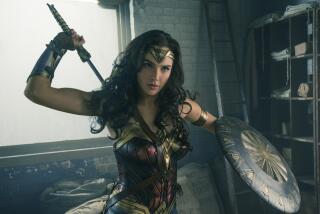Video Game Maker Finds Shock Value
- Share via
A beat-up sedan cruises up to a woman on a street corner. She climbs in, and the car rocks back and forth. When she steps out of the car, the driver follows, beats her to death with a baseball bat and steals her money.
It’s not a scene from a Quentin Tarantino movie. It’s a video game called “Grand Theft Auto 3” published by Rockstar Games, a company that established itself as the bad boy of the $20-billion global games industry by serving up unapologetically violent titles.
Violence is nothing new to video games, and every few years a game comes along that stirs the puritanical pot of American sensibilities.
What’s extraordinary is that “GTA3”--in which players can hijack cars, shoot pedestrians and kill police officers--is so over-the-top that even industry veterans are questioning whether Rockstar is inviting censorship by feeding an appetite among minors for prurient games.
“It’s like selling cigarettes to kids,” said Jason Rubin, co-founder of Naughty Dog Inc., a Santa Monica game developer owned by Sony Corp. “The game is rated for adults, but you know kids are playing it because they think it’s cool.”
Parents and politicians may cringe, but Rockstar’s blend of edgy electronic entertainment and Mafioso satire proved to be just the right cocktail for a generation of gamers who grew up on “Pac Man” and are itching for grittier games. “GTA3” was the industry’s most popular title in 2001, selling 3 million copies since its October debut.
It has generated nearly $100 million in revenue for Rockstar and its parent, Take Two Interactive Software Inc. The company’s fiscal year ended eight days after “GTA3” launched. Take Two lost $8.6 million on $451 million in sales, compared with a $6.4-million profit the year before on $364 million in sales. In its quarter ended Jan. 31, Take Two rebounded with a 79% increase in quarterly sales to $283 million, and record profit of $34.8 million, nearly quadruple its fiscal first quarter last year.
With these numbers, Take Two is a hit on Wall Street. Investors largely have chosen to overlook an investigation by the Securities and Exchange Commission of Take Two’s finances and pushed the New York company’s stock up more than 75% since the game was released. Take Two’s stock closed Friday at $19.96 on Nasdaq.
Take Two and Rockstar refused repeated requests for interviews to discuss the company’s games and its business.
But that hasn’t stopped others from talking about “GTA3.” Sen. Joseph I. Lieberman (D-Conn.) has called the game “troubling.” Even hard-core fans take notice of the game’s violence. A posting on Gamespot.com, a Web site for game enthusiasts, called “GTA3” “one sick puppy.”
What worries Rubin, however, is not that “GTA3” contains violence. It’s that the game is deliberately designed to shock. The commercial success of the title all but guarantees that other publishers will rush to release copycat games.
The result, Rubin said, is that mature-rated games will become standard fare, and character-based games such as the ones Rubin produces will be shunted into niche markets.
Rubin points to the increase in M-rated titles in the list of best sellers as proof. None of the top 10 titles for the PlayStation console, which came out in 1995, was M-rated. Seven were rated E, for everyone, and three were rated T, for teens. The same list for the current PlayStation 2 console contains two M-rated, three T-rated and five E-rated games.
“There’s going to be a race to be more hard-core, more violent, more disgusting, and the nastiest will sell well,” Rubin said. “At some point, it’s simply a gore fest. I worry that we will lose control.
“Every medium has gone through a period like this. Elvis shook his hips and everybody went wild. But music is considered an art form. Video games to many people aren’t considered an art form, at least not yet. They still see it as a toy, one that can be regulated like other toys.”
Within the game industry, Rubin is in the minority.
“When I think of censorship, I think of government regulating content, and that’s not going to happen,” said Doug Lowenstein, president of the Interactive Digital Software Assn., an industry group based in Washington. “I see a very healthy respect for the 1st Amendment.”
Lowenstein said the percentage of M-rated games has remained constant at 6% to 8%. That’s partly because an M rating restricts the purchasers to those 17 years and older, limiting the potential revenue source.
“You won’t see major publishers jumping on the ultra-violent bandwagon,” said Jason Bergman, a freelance game journalist in New York who has followed Rockstar for several years. “It’s a difficult thing to pull off well.”
Electronic Arts Inc., the nation’s largest game publisher, has avoided publishing M-rated games. The tendency reflects the philosophy of EA’s studio president, Don Mattrick, who believes that as game consoles move out of the basement and into living rooms, the company should make games the entire family can play and watch. In 1999, EA refused to distribute a game called “Thrill Kill.” The controversial game featured dozens of highly graphic ways, from dismemberment to cannibalism, to kill an opponent.
“We’re aware of the revenue potential for mature-rated games, but we manage well-defined brands that have solid equities as E- and T-rated products,” said Jeff Brown, an EA spokesman. “Gamers ... recognize that and would object to seeing those equities compromised in pursuit of a trend toward gratuitous sex and violence.”
Whether Rockstar is aiming for sexually gratuitous or artistically gratifying is unclear. “They’re young men in their 20s and 30s making games for themselves,” said Edward Williams, an analyst with Gerard Klauer Mattison & Co. in New York. “Their target demographic is males in their 20s and 30s.”
Over the years, Take Two has cultivated a bad-boy image. At an industry trade show last year, a Take Two subsidiary, Gathering of Developers, set up a tent with strippers and dancing midgets. At an awards ceremony this year sponsored by the Academy of Interactive Arts and Sciences where “GTA3” was nominated for two categories, Rockstar was a no-show.
Three years ago, the company’s soirees acquired notoriety in New York for the way its guests were chosen. To get invited, they had to subject themselves to a seven-question telephone quiz designed to gauge their worthiness. Those who gave interesting answers got tickets.
Take Two was founded 10 years ago by then 20-year-old Ryan A. Brant, son of a New York real estate developer and magazine publisher. Today he is the company’s chairman. The company, which leases its New York offices from Brant’s father, went on the acquisition trail in the late ‘90s.
In 1998, it purchased Jack of All Games Inc., a distribution business that accounts for about one-third of the company’s revenue, or $17million.
In 1999, it spent $25 million buying distributors and studios, including DMA Designs, the Scottish studio that develops the “GTA” franchise.
In 2000, it paid $6 million for Pop Top Software Inc. and $14.4 million for Gathering of Developers Inc., the makers of “Max Payne” and the Duke Nukem franchise.
Trouble cropped up late last year when the Securities and Exchange Commission launched an investigation of Take Two’s accounting practices. Its chief financial officer, with just two months on the job, resigned in December, and trading of the stock on Nasdaq halted Jan. 22 when the company said it would postpone release of its fiscal-year earnings. Trading resumed Feb. 15. Take Two issued restated earnings for seven quarters to Oct. 31. A spokesman for the SEC declined to comment.
Take Two had to later correct its restated earnings, reducing fiscal 2000 revenue by $23 million to $364 million, and slicing profit that year by $28.5 million to $6.4 million. Six class-action lawsuits have been filed against Take Two on behalf of shareholders alleging that the company misled investors. The company has said it intends to fight the suits.
All this doesn’t seem to faze Wall Street, which has bumped up Take Two shares more than 7% since the company restated its earnings Feb. 15.
“The reality is that Take Two has the right products, but it does come with issues,” Gerard Klauer analyst Williams said. “As with any entertainment, there are certainly aspects of their games that will offend a lot of people.
“What investors see, though, are the financials of the company. There are plenty of violent video games out there that don’t sell nearly as well as this one. Cash is flowing into this company at an unbelievable clip.”






